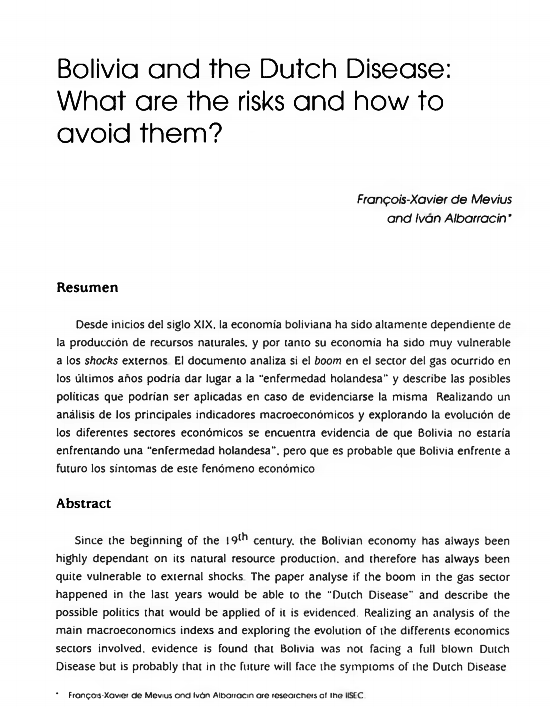Bolivia and the Dutch Disease: What are the risks and how to avoid them?
DOI:
https://doi.org/10.35319/lajed.200911171Keywords:
Human Resources, MacroeconomyAbstract
Since the beginning of the 19th century, the Bolivian economy has been highly dependent on the production of natural resources, and therefore its economy has been very vulnerable to external shocks. The document analyzes if the boom in the gas sector occurred in recent years could lead to the "Dutch disease" and describes the possible policies that could be applied in case of evidence of it. Analyzing the main macroeconomic indicators and exploring the evolution of the different economic sectors, we find evidence that Bolivia would not be facing a "Dutch disease", but that Bolivia is likely to face the symptoms of this economic phenomenon in the future.
Downloads
References
Ahmad, E. and Singh, R. January 2003. "Political economy of oil-revenue sharing in a developing country: Illustrations from Nigeria". Washington: IMF Working Paper WP/03/16.
Ahrend, R. February 2006. "How to Sustain Growth in a Resource Based Economy? The Main Concepts and their Application to the Russian Case". Economics Department Working Papers. OECD, No. 478.
Andersen, L.E. 2007. "How best to use the extraordinary natural gas revenues in Bolivia? Results from a Computable General Equilibrium Model". La Paz: Fundación Milenio, Documentos de Trabajo.
Banco Central de Bolivia. 2007. "Bolivia. Memorias Anuales del Banco Central (2006)" La Paz: Banco Central de Bolivia.
Centro de Estudios para el Desarrollo Laboral y Agrario (CEDLA). September 2007. "Boletín de Seguimiento a Políticas Publicas", Segunda Época, Año IV, N° 8.
Collier, P. and J.W Gunning. 1999. "Trade Shocks: Theory and Evidence". En P Collier, J.W Gunning y Asociados, Trade Shocks in Developing Countries, New York: Oxford University Press. pp. 1-63.
Corden, WM. and J .P. Neary. 1982. "Booming Sector and De-Industrialisation in a Small Open Economy". The Economic Journal, Vol. 92, N° 368, pp 825-848.
Corden, WM. 1984. "Booming Sector and Dutch Disease Economics: Survey and Consolidation". Oxford Economic Papers, New Series, Vol. 36, N° .3, pp 359-380.
Davis, J., R. Ossowski, J. Daniel and S. Barnett. December 2001. "Les Fonds Pétroliers: Des Problémes Sous Couvert de Solutions?". Finances &. Développement.
Faria, Hugo J. May 3 1997. "Falacias y mitos". In : El Universal
GuiaSenior. May 15 2007. "Chile y la enfermedad holandesa". The Wall Streetjournal. http:llblog.guiasenior.com/archives/2007/05/chile-y-la-enfermedadholandesa.html
Gylfason, T 2001 "Natural resources, education, and economic development". European Economic Review. Vol.45 pp.847-859.
Gylfason, T, T Herbertsson and G. Zoega. 1997. "A Mixed Blessing: Natural Resources and Economic Growth". Discussion Paper N° 1668.
Haussmann, R. and R. Rigobón. December, 2002. "An alternative interpretation of the resource curse: Theory and policy Implications". NBER Working Paper 9424.
Ibarra, C. March 31 2006. "Fondo de estabilización macroeconómica evita disminución de la inversión social". Ministerio del Poder Popular para la Comunicación y la Información. http://www.minci.gov.ve/reportajes/2/5731/fondodeestabilizacion.html
IBCE, CANEB, INE and UDAPE. April 2006. Empleo exportador en Bolivia.
International Monetary Fund. 2007. "Bolivia, Selected Issues". IMF Country Report No. 87/249. Washington, DC: IMF.
Larsen, E. R. July 2006. "Escaping the Resource Curse and the Dutch Disease? When and Why Norway Caught Up with and Forged Ahead of Its Neighbours". American Journal of Economics and Sociology, Vol. 65, N° 3.
McMahon, G. October 21, 1997. "The Natural Resource Curse: Myth or Reality?". Economic Development Institute., World Bank, Washington, D.C.
Migara, K. and O. De Silva. 1994. "The Political Economy of Windfalls: The Dutch Disease- Theory and Evidence". Center in Political Economy, Washington University, St. Louis, MO.
Ministry of Planning and Finance of Timor-Leste. October, 2004. "Establishing a Petroleum Fund for Timor-Leste". Public Consultation Discussion Paper.
Morales, J. A., J. Espejo and G. Chávez. 1992. "Shocks externos transitorios y políticas de estabilización". In E. Engel and P. Meller (compiladores), Shocks externos y mecanismos de estabilización. Santiago: CEIPLAN y BID. pp. 183-230.
Morales, J. A. and J. Espejo. 1995. "Efectos macroeconómicos de los shocks de precios de exportación". In: A. Pasco-Font (ed). La administración de los ingresos por exportación mineras en Bolivia, Chile y Perú. Lima: GRADE.
Morales, J. A. 1999. "Bolivia's Tin and Natural Gas Crises of 1985-1989" In Collier, P. And Gunning, J.W. (compiladores) Trade Shocks in Developing Countries. Oxford: Oxford University Press.
Sala-i-Martin, X. and A. Subramanian, June, 2003. "Addressing the Natural resource curse: An illustration from Nigeria". NBER Working Paper, 9804.
Skancke, M. October 2006. "Workshop on Petroleum Revenue Management". Norwegian Ministry of Finance.
UNCTAD. November, 2005. "Developments in Latin America and Caribbean Trade and Maritime Transpon". Review of Maritime Transport, UNCTAD/RMT/2005.
Urcullo Cossio, G .. K. Capra Seoane and A. Lazo Suárez. January. 2005. "Estructura del sector transportes en Bolivia". Unidad de Análisis de Políticas Sociales y Económicas.
Velasquez-Donaldson. C. 2007. "Analysis of the Hydrocarbon Sector in Bolivia: How are the Gas and Oil Revenues Distributed?". Institute for Advanced Development Studies. Development Research Working Paper Series. No. 6/2007.






